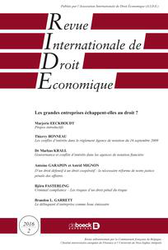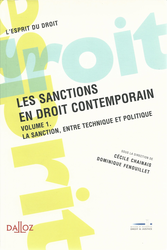June 10, 2020
Thesaurus : Doctrine

Full reference : Fasterling, B., "Criminal Compliance - Les risques d'un droit pénal du risque", Revue internationale de droit économique, 2016/2 (t.XXX), p. 217-237

June 21, 2016
Breaking news

June 16, 2016
Thesaurus : Doctrine
March 11, 2015
Thesaurus : Doctrine

Feb. 14, 2015
Sectorial Analysis

The repression is inseparable from how to repress. This is why the procedural difficulties are indicative of underlying fundamental problems. Currently, the basic issue updated by the battles around the procedures of financial sanctions is about the sanction bais.
For the regulator, the penalty is one tool among others to regulate financial markets. The penalty in a continuum with its legislative powers, are its teeth and claws through which financial markets are developing. The purpose of financial policy justifies an objective repression with a probationary system often based on presumptions leading to impute breaches players in some positions on or financial markets. The regulator must have this card in hand and use it according to this method.
Moreover, if it happens that people commit reprehensible misconducts, perceived as such by the social group, they should be punished, possibly up to the prison. Only the criminal justice is legitimate to do so legitimately weighed down by the burden of proving intentionality, etc.
We must distinguish these two types of criminality. It is from there that the two procedures and two probationary systems can take place at the same time but on different offenses.
For now this is not the case, as "financial misconduct" are only the carbon copy of "financial crimes" lightened loads of evidence that protected the defendant and who should answer for now twice.
Procedural problem? No, problem of criminalization, which won't be released by procedural solutions, the most hazardous being to create a new institution, the most calamitous being to weaken the system by removing one of the ways of prosecution. It is necessary to make distinctions in the offenses that are currently redundant.
Thus, repression as a regulatory tool used by the Regulator is in focus, but the real financial criminal law remains to be consolidated to achieve its own and classic goal: punish faults including through the prison.
May 5, 2013
Thesaurus : Doctrine

Complete reference : CHAINAIS, Cécile, FENOUILLET, Dominique (ed.), Les sanctions en droit contemporain, vol. 1, La sanction, entre technique et politique, coll. "L'esprit du droit", Dalloz, 2012, 634 p

